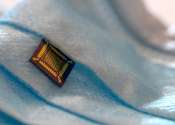Printing with sound: Researchers use acoustic forces to print droplets that couldn't be printed before
Harvard University researchers have developed a new printing method that uses sound waves to generate droplets from liquids with an unprecedented range of composition and viscosity. This technique could finally enable the ...
Aug 31, 2018
0
901









